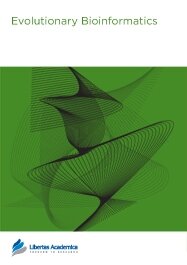

Publication Date: 11 Jun 2012
Type: Original Research
Journal: Evolutionary Bioinformatics
Citation: Evolutionary Bioinformatics 2012:8 271-292
doi: 10.4137/EBO.S9652

Rapid alkalinization factors (RALFs) are plant small peptides that could induce a rapid pH increase in the medium of plant cell suspension culture and play a critical role in plant development. The evolutionary process of the RALF gene family remains unclear. To obtain details of the phylogeny of these genes, this study characterized RALF genes in Arabidopsis, rice, poplar and maize. Phylogenetic trees, evolutionary patterns and molecular evolutionary rates were used to elucidate the evolutionary process of this gene family. In addition, the different signatures of selection, expression patterns, and subcellular localization of RALFs were also analyzed. We found that the RALF gene family had a rapid birth process after the separation of the eudicot and monocot species about 145 million years ago, that tandem duplication played a dominant role in the expansion of Arabidopsis and rice RALF gene family, and that RALFs were under purifying selection according to estimations of the substitution rates of these genes. We also identified a diverse expression pattern of RALF genes and predominant extracellular localization feature of RALF proteins. Our findings shed light on several key differences in RALF gene family evolution among the plant species, which may provide a scaffold for future functional analysis of this family.
PDF (6.73 MB PDF FORMAT)
RIS citation (ENDNOTE, REFERENCE MANAGER, PROCITE, REFWORKS)
BibTex citation (BIBDESK, LATEX)
XML
PMC HTML

This is the fastest progress we have experienced from submission to acceptance. Reviews are fast, pertinent, and instructive. Every step of the process is visible and prompt, and every email is friendly and immediate. In all, it is an excellent experience to be published in Libertas Academica.

All authors are surveyed after their articles are published. Authors are asked to rate their experience in a variety of areas, and their responses help us to monitor our performance. Presented here are their responses in some key areas. No 'poor' or 'very poor' responses were received; these are represented in the 'other' category.See Our Results
Copyright © 2013 Libertas Academica Ltd (except open access articles and accompanying metadata and supplementary files.)
Facebook Google+ Twitter
Pinterest Tumblr YouTube